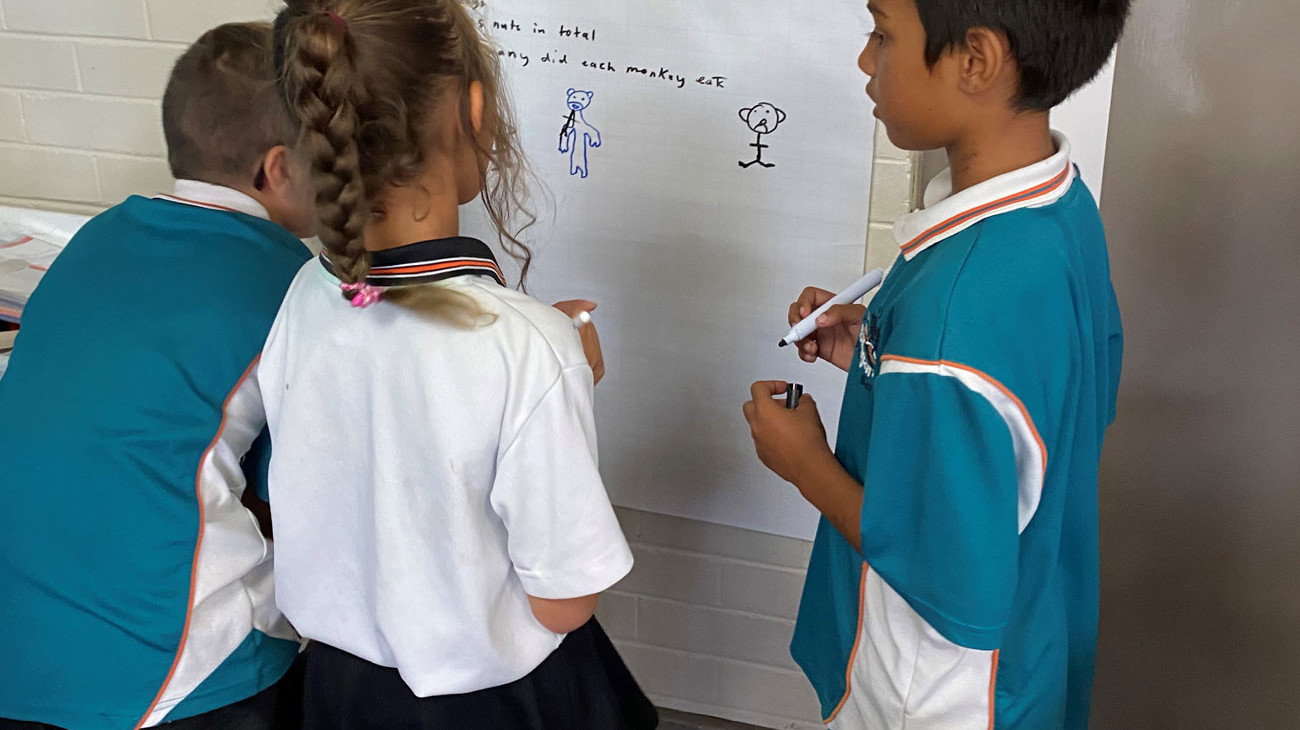Posted Friday, 11 July 2025
Wellard students build coding confidence
Students are building their skills in digital technologies, using pocket-sized computers to create everything from step …
Recognising the difference between being a facilitator for learning, rather than simply a provider of solutions, has provided freedom to learn for both Emily Grainger and her students.

Hi everyone,
My name is Emily Grainger and I’m a year 4 teacher at Bungaree Primary School. This is my first Blog entry for the Alcoa Champions of Maths program, and I’m happy to share my incredibly positive learning experience to date.
On the last day of Term 2, I asked the students to write about two ‘highlights’ for Semester 1. Most students wrote about ‘problem solving’ as one of their highlights. The students explained in their writing that they enjoyed it as it allowed them to learn difficult concepts and work in small groups. One student wrote that he found it easier to learn when he had support from his peers in a small group.
The students have tackled these problems using a variety of strategies without even realising it. The most interesting part of a problem-solving lesson is watching the students identify and investigate more efficient strategies. You can see the change occur in their whiteboards. They often start with a pictorial or listing strategy, and then many find a pattern or rule they can use to extrapolate.
I have thoroughly enjoyed watching my students develop their confidence in not only tackling challenging mathematical problems, but in their ability to explain the mathematical principles.
For my class, this experience has been a great motivator for encouraging deep discussions about maths. My students have learnt that they cannot just answer a question without also explaining ‘why?’.
Classroom Example
Problem: Adam bought a watch for 50 cents. Unfortunately, it gains 30 minutes every day!
If Adam set his watch at noon one day, how long would it be before it next correctly shows 12 o’clock again?
I found that most students struggled with the problem as it included the concept of ‘time.’ When I asked one student what happened when we added thirty minutes to 12:30, she replied with “12:60.” At this point I realised there would be some difficulty with identifying the multiplicative rule as many students did not have that foundational understanding of the relationship between minutes and hours.
When it came to the discussion, we discussed how students started listing the days and adding 30 minutes each day. The second group explained that they started listing every other day as they realised that every two days the watch was faster by an hour. The students were therefore happier counting in one whole hour. The last group identified this idea quickly stating that they ‘skip counted by two.’ When we realised that it took 24 days, students could not explain the relationship between 12 (number of hours between noon and 12) and two (the number of 30 minutes in an hour).
I used this lesson as an important teaching moment for myself. I recognised the need for more lessons in time, and problem-solving questions to link the relationship between fractions and time.
Going forward, my focus as a teacher will not only be on problem solving, but to also continue to push students to ask ‘why?’ I think it is so critical for our students to question and inquire about the world around them. In mathematics, this has been key to the students pushing themselves. Just because one student does not automatically recall their times tables does not mean they aren’t able to problem solve and identify links in their mathematical knowledge.
This experience has shown me that my students have a much deeper understanding of mathematics than I give them credit for.
Problem-solving lessons have allowed my students to strengthen their knowledge of decimals, multiples, number patterns and fractions. It has tested my own understanding of mathematical principles and allowed me the opportunity to learn with my students. It has been so pleasing to see my less confident students shine and attempt to use their reasoning skills. My students enjoy the fact that they can all come to the same answer in various ways. Each problem allows for multiple entry points for students no matter their ability.
My class gets very excited for problem solving lessons as it provides them with a challenge and an opportunity to work with their peers. They don’t focus on the answer, they focus on the strategy and the process. When we share as a class, they are most excited to show how they worked out the problem. They don’t look to me as a provider of solutions but as a facilitator for learning. It has been so freeing to hand over the responsibility for learning from me to them. I look forward to seeing how I can continue to facilitate and encourage this student agency in my classroom.
Would you like to continue a discussion on this topic with other educators? Join our Facebook group!
If you are interested in joining the Alcoa Maths Enrichment Program please fill out the enquiry form below and a Scitech representative will be in touch with you.
Upon clicking the "Book Now" or "Buy Gift Card" buttons a new window will open prompting contact information and payment details.